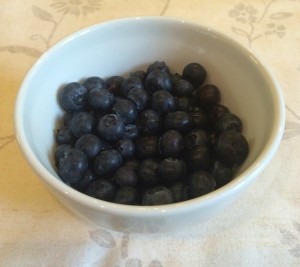
The super super-fruit: low-fat low-sugar blueberries are loaded with anti-ageing nutrients. And taste delicious, too
The first time I ate a blueberry, I was a child and it was in an “American muffin”. I’d never heard of blueberries or muffins, or met an American, but I was convinced that great nation was on to a great thing.
I didn’t mean the muffins. I sensed that delicious little fruit was good for you. I mean, how many things do we eat that are blue? It’s a bit like Ribena and that has Vitamin C, yes? Cool.
Fortunately, given how many I’ve eaten since, it’s now widely accepted that blueberries are in the royal family of super foods. This is, according to dieticians, because they are rich in substances called flavonoids and one type in particular: anthocyanins, which are in their bluish colour (from the Greek for “blue flower”).
Big names, big tasks. These substances are apparently potent antioxidants, which protect our bodies from the oxidising effects of free radicals. Translated, these are unstable molecules that can damage our cells and DNA, and contribute to ageing and diseases like cancer. And our body is continuously going through it.
Free radicals can also oxidise the LDL (“bad”) cholesterol in our blood, which can contribute towards heart disease. Happily, the antioxidants in blueberries may protect LDL from damage, as well as benefit people with high blood pressure.
Impressive – but that’s not all. Some studies suggest blueberries are good for students and seniors alike, as they improve brain function and protect against Alzheimer’s disease, as well as guard the eyes against age-related degeneration.
Anthocyanins may also have anti-diabetic effects, helping improve insulin sensitivity and lower blood sugar levels. Big claims with big implications.
And, like cranberries, blueberries also contain substances that can prevent certain bacteria from binding to the wall of the bladder, which may help prevent urinary tract infections.
No wonder they are considered a super food. Though it’s not just flavonoids. Blueberries are also a good source of the antioxidant Vitamin C, which helps produce the collagen that holds our bodies together – and boosts your complexion.
There’s also fibre, whose often coyly underestimated but vital benefits include preventing and curing constipation, along with reducing high blood pressure and cholesterol, as well as warding off bowel and colon problems, and diabetes and obesity. Or, as one old lady I met in the supermarket put it, great for your pipe.
There are a few more nifty ingredients, like pectin, which also helps to lower cholesterol and eliminate toxic metals. And manganese, an element whose varied skills include aiding metabolism, promoting fertility, reversing osteoporosis, and preventing diabetes and nerve-muscle disorders.
The antioxidant Vitamin E also benefits fertility, wards off allergies, cataracts, numerous skin problems and PMS, and may help slow down Alzheimer’s.
And finally Vitamin K, which is involved with blood clotting, bone building and preventing osteoporosis.
In the health stakes, the small fruit packs a mighty punch.
So, if you are shopping, here are blueberries in numbers: 100g (3.5oz) provides 57 calories, 14.5g of carbohydrates, of which 2.4g is fibre and 9.9g the natural sugars fructose and glucose, 84g of water, and traces of protein and fat.
Low in fat and sugar, high in nutrients and taste. It’s a no brainer for a sharper brain. Blueberries are just super food.


Comments are closed.